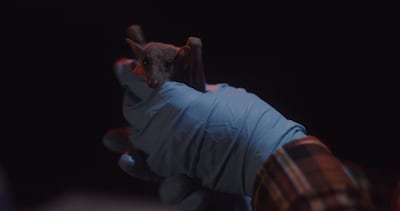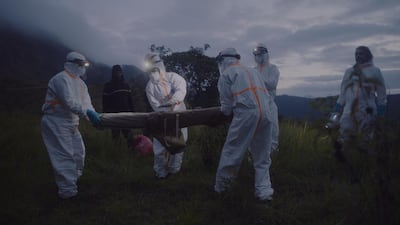One of the biggest surprises of the coronavirus pandemic was how ill-prepared people were to deal with it. Around the world, governments tried to find the right way to handle the rising number of infections and deaths.
By the time many borders were closed and safety measures imposed, the virus had already spread enough to cause a pandemic. While we are still very much in the thick of it, the worst could still be ahead of us.
"Another pandemic could be just around the corner," epidemiologist Christopher Golden says. His words are chilling, but fear-mongering is not his intent. Rather, he wants us to be prepared for what is yet to come.
For the better part of the year, Golden, along with ABC News foreign correspondent James Longman and their team have been travelling the world to get a better understanding of how zoonotic diseases – those that are shared between animals and humans, such as Covid-19 and Ebola – become an epidemic. He has also been trying to identify what lessons can be learnt from previous outbreaks in the hopes of preventing future ones before it's too late.
Golden's journey and findings are the focal point of new documentary series Virus Hunters. The show premiered on National Geographic Abu Dhabi on November 26 and is now available to stream in full on the National Geographic website.
The series follows Golden and his team as they head to places such as Liberia, where they study the outbreak of the Ebola virus in 2014, then to southern Turkey and to Wisconsin and Iowa in the the US Midwest, where an unusually high number of Covid 19 cases were reported.
“To be honest, being in Turkey and Liberia felt so much safer than being in the US Midwest,” Golden says. “Few people there were acting responsibly from a public health standpoint.”
Filming during the coronavirus wasn't easy. Some countries they wanted to film in were not open at all, and it became impossible to include some stories. Fortunately, this did not minimise the show's central message: the coronavirus pandemic should be a wake-up call.
The idea for the documentary series came after director Drew Pulley saw a short film on National Geographic that showcased Golden’s research in Madagascar that revealed unexpected connections between environmental trends and human health.
"The short film highlighted the ways in which rapidly accelerating human-driven environmental change has led to conflicts with human well-being and public health," Golden says. "These stories are a general pattern across the globe and telling their stories are so important for us to learn from this history."
The same is true for Virus Hunters. Golden hopes that his findings will help better prepare for future pandemics. While the Covid-19 outbreak, he says, could not have been avoided, it certainly could have been dealt with more effectively. Still, there are lessons to be learnt, he says. Ones that could help minimise the risks of future pandemics or stop them before they even begin.
And it is clear to Golden that there will be future pandemics.
He says the widespread transformation of natural environments through deforestation, urbanisation and agricultural expansion has led to increased human encroachment on wild habitats as well as a growth between humans and wild and domesticated animals. These factors precipitate the emergence of zoonotic diseases.
Slowing these diseases down and making them less frequent will require more care for the planet.
“The health of people and the health of the planet are inextricably woven together,” he says. “Without our diligent care for the planet, stewarding natural resources and managing natural systems, we will continue to see the impacts of these pandemics in our future. We cannot expect to maintain public health without considering planetary health.”
Golden says it is vital that we look at the underlying causes of these outbreaks. They are rooted in the way society has transformed and degraded environmental systems. "If we can start to reverse this and conserve the environment, we will see a healthier future."
Killing of Qassem Suleimani
More from Neighbourhood Watch:
Zayed Sustainability Prize
More on Quran memorisation:
COMPANY%20PROFILE
%3Cp%3E%3Cstrong%3ECompany%20name%3A%3C%2Fstrong%3E%20Revibe%20%0D%3Cbr%3E%3Cstrong%3EStarted%3A%3C%2Fstrong%3E%202022%0D%3Cbr%3E%3Cstrong%3EFounders%3A%3C%2Fstrong%3E%20Hamza%20Iraqui%20and%20Abdessamad%20Ben%20Zakour%20%0D%3Cbr%3E%3Cstrong%3EBased%3A%3C%2Fstrong%3E%20UAE%20%0D%3Cbr%3E%3Cstrong%3EIndustry%3A%3C%2Fstrong%3E%20Refurbished%20electronics%20%0D%3Cbr%3E%3Cstrong%3EFunds%20raised%20so%20far%3A%3C%2Fstrong%3E%20%2410m%20%0D%3Cbr%3E%3Cstrong%3EInvestors%3A%20%3C%2Fstrong%3EFlat6Labs%2C%20Resonance%20and%20various%20others%0D%3C%2Fp%3E%0A
The years Ramadan fell in May
The burning issue
The internal combustion engine is facing a watershed moment – major manufacturer Volvo is to stop producing petroleum-powered vehicles by 2021 and countries in Europe, including the UK, have vowed to ban their sale before 2040. The National takes a look at the story of one of the most successful technologies of the last 100 years and how it has impacted life in the UAE.
Read part four: an affection for classic cars lives on
Read part three: the age of the electric vehicle begins
Read part one: how cars came to the UAE
More from Neighbourhood Watch:
Specs
Engine: Dual-motor all-wheel-drive electric
Range: Up to 610km
Power: 905hp
Torque: 985Nm
Price: From Dh439,000
Available: Now
Killing of Qassem Suleimani
Killing of Qassem Suleimani
Mohammed bin Zayed Majlis
More from Neighbourhood Watch:
Ferrari 12Cilindri specs
Engine: naturally aspirated 6.5-liter V12
Power: 819hp
Torque: 678Nm at 7,250rpm
Price: From Dh1,700,000
Available: Now
KILLING OF QASSEM SULEIMANI
Five hymns the crowds can join in
Papal Mass will begin at 10.30am at the Zayed Sports City Stadium on Tuesday
Some 17 hymns will be sung by a 120-strong UAE choir
Five hymns will be rehearsed with crowds on Tuesday morning before the Pope arrives at stadium
‘Christ be our Light’ as the entrance song
‘All that I am’ for the offertory or during the symbolic offering of gifts at the altar
‘Make me a Channel of your Peace’ and ‘Soul of my Saviour’ for the communion
‘Tell out my Soul’ as the final hymn after the blessings from the Pope
The choir will also sing the hymn ‘Legions of Heaven’ in Arabic as ‘Assakiroo Sama’
There are 15 Arabic speakers from Syria, Lebanon and Jordan in the choir that comprises residents from the Philippines, India, France, Italy, America, Netherlands, Armenia and Indonesia
The choir will be accompanied by a brass ensemble and an organ
They will practice for the first time at the stadium on the eve of the public mass on Monday evening
Killing of Qassem Suleimani
The years Ramadan fell in May
More on Quran memorisation:
The specs
Engine: 4.0-litre V8 twin-turbocharged and three electric motors
Power: Combined output 920hp
Torque: 730Nm at 4,000-7,000rpm
Transmission: 8-speed dual-clutch automatic
Fuel consumption: 11.2L/100km
On sale: Now, deliveries expected later in 2025
Price: expected to start at Dh1,432,000
More from Neighbourhood Watch:
Springtime in a Broken Mirror,
Mario Benedetti, Penguin Modern Classics
How to keep control of your emotions
If your investment decisions are being dictated by emotions such as fear, greed, hope, frustration and boredom, it is time for a rethink, Chris Beauchamp, chief market analyst at online trading platform IG, says.
Greed
Greedy investors trade beyond their means, open more positions than usual or hold on to positions too long to chase an even greater gain. “All too often, they incur a heavy loss and may even wipe out the profit already made.
Tip: Ignore the short-term hype, noise and froth and invest for the long-term plan, based on sound fundamentals.
Fear
The risk of making a loss can cloud decision-making. “This can cause you to close out a position too early, or miss out on a profit by being too afraid to open a trade,” he says.
Tip: Start with a plan, and stick to it. For added security, consider placing stops to reduce any losses and limits to lock in profits.
Hope
While all traders need hope to start trading, excessive optimism can backfire. Too many traders hold on to a losing trade because they believe that it will reverse its trend and become profitable.
Tip: Set realistic goals. Be happy with what you have earned, rather than frustrated by what you could have earned.
Frustration
Traders can get annoyed when the markets have behaved in unexpected ways and generates losses or fails to deliver anticipated gains.
Tip: Accept in advance that asset price movements are completely unpredictable and you will suffer losses at some point. These can be managed, say, by attaching stops and limits to your trades.
Boredom
Too many investors buy and sell because they want something to do. They are trading as entertainment, rather than in the hope of making money. As well as making bad decisions, the extra dealing charges eat into returns.
Tip: Open an online demo account and get your thrills without risking real money.
Red flags
- Promises of high, fixed or 'guaranteed' returns.
- Unregulated structured products or complex investments often used to bypass traditional safeguards.
- Lack of clear information, vague language, no access to audited financials.
- Overseas companies targeting investors in other jurisdictions - this can make legal recovery difficult.
- Hard-selling tactics - creating urgency, offering 'exclusive' deals.
Courtesy: Carol Glynn, founder of Conscious Finance Coaching
Drishyam 2
Directed by: Jeethu Joseph
Starring: Mohanlal, Meena, Ansiba, Murali Gopy
Rating: 4 stars





